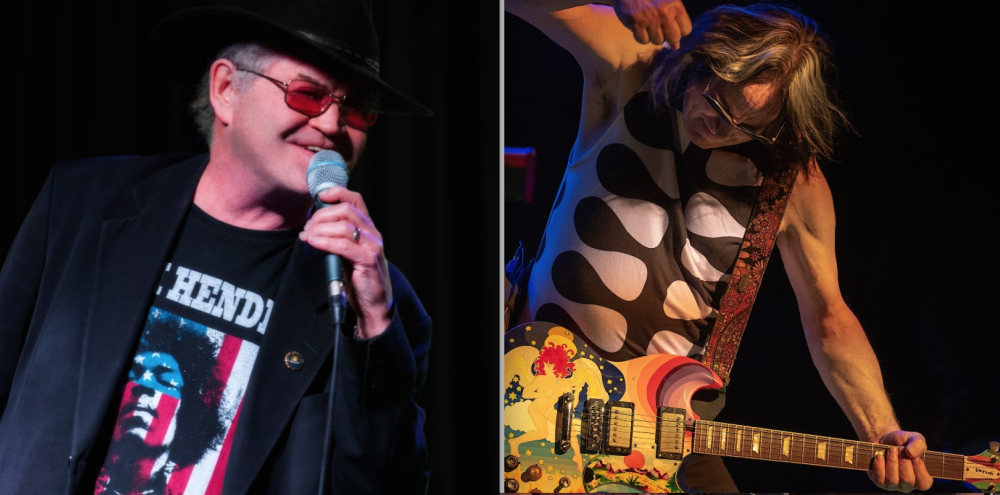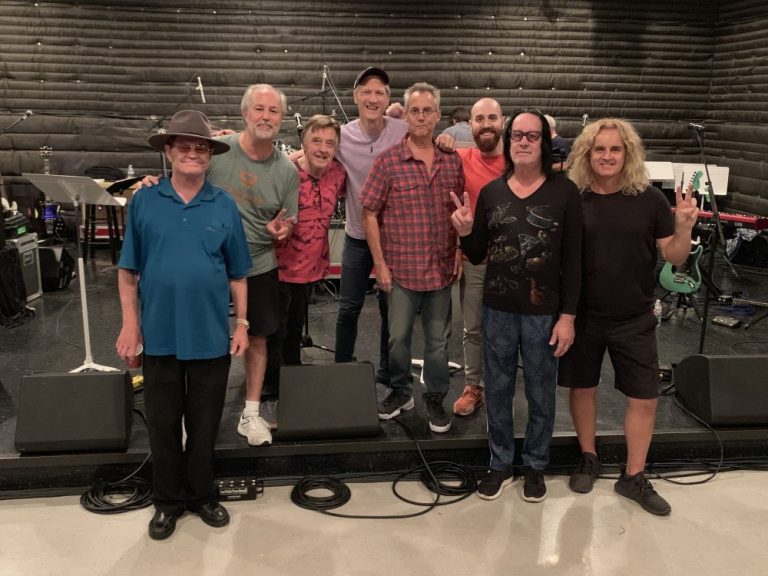Monkees/Badfinger/Nazz Supergroup Gets Back to ’68 by Touring Beatles’ ‘White Album’

The 50th anniversary re-release of 1969’s “Abbey Road” may be just days away, but that doesn’t mean Beatles fans have been there and done that when it comes to celebrating ’68. Todd Rundgren, the Monkees’ Micky Dolenz, Badfinger’s Joey Molland and several other name musicians of a certain vintage are teaming up to go out on tour playing one of the Fab Four’s most controversial projects, the two-LP, four-sided White Album.
Starting Sept. 21 at Atlantic City’s Golden Nugget Casino, “It Was Fifty Years Ago Today — A Tribute to the Beatles’ White Album” will spend a month barnstorming across the northeastern U.S. under the watchful gaze of Joey Curatolo, the musical director of “Rain: A Tribute to The Beatles,” and Flower Power Concerts.
Sure, there’s the fact that the tour’s title paraphrases from 1967’s “Sgt. Pepper’s Lonely Hearts Club Band,” and that the White Album is now 51 years old as opposed to 50. Maybe the messiness of the tour’s title is meant to reflect the schizophrenic (or, rather quadrophenic) nature of the White Album itself and the fractured manner in which it was devised. All quibbles must pass when members of such contemporaneous late ’60s groups as the Monkees, Badfinger and the Nazz are united in the salute.
Rundgren has some impeccable cred with Beatles fans. He and George Harrison did the production duties on a Badfinger album for Apple Records in 1971, “Straight Up” — featuring current tour mate Molland, of course — even if the “collaboration” had more to do with Rundgren taking over after Harrison split. In 1997, Rundgren wrote and recorded “Up Against It!,” an album of his demos for the musical theater adaptation of a stage show originally written in 1967 by Joe Orton for the Beatles. Most famously and recently, Rundgren appeared as part of the drummer’s All Starr Band for a number of tours.
Dolenz goes back a bit more: He hung out with Paul McCartney during the making of “Sgt. Pepper’s.” And Badfinger, needless to say, was signed to the Beatles’ Apple label, where they had a massive hit recording the song Paul McCartney gave them, “Come and Get It” (a demo version of which is included in the forthcoming “Abbey Road” box set).
We don’t know what connection soft rock crooner Christopher Cross or Jason Scheff of Chicago — also on the tour — have to the Beatles, but the more, the merrier.
When it came to Dolenz, the singer and drummer had just came off a rare tour with fellow Monkee Michael Nesmith and was anxious to relive the moments of his youth where Beatlemania and Monkeemania intertwined.
“The Monkees were preparing to go on tour in England in 1967, and I went over by myself, first, to do some early press junkets,” says Dolenz. “One of the publicists who worked with both us and the Beatles thought it might be great to get a photo of me together with them, as there had been some bullshit competition between us that never truly existed. Something stupid.”
McCartney must have caught wind of this, and wound up calling Dolenz personally, and invited him over for dinner. “Just he and I — and our handlers — having a casual chat. I ran into him a few years ago during his rehearsal for Coachella, and he remembered everything about the dinner… down to watching television.”
When McCartney turned around after that dinner and asked Dolenz if he wanted to stop by the studio at Abbey Road where the Beatles were recording “Sgt. Pepper’s,” Dolenz said, “I just about wee-ed myself right there. I was a huge Beatles fan. It was all I could do to not ask for his autograph the whole time.” The first tracking session that Dolenz attended was for “Good Morning, Good Morning,” with “A Day in the Life” following.
“I kind of became friends with them after that, especially Ringo when he moved out to L.A. and he became buddies with my best friend, Harry Nilsson,” says Dolenz, talking about what might be called rock’s original Hollywood vampires. “I hung out with John when he was here for his ‘lost weekend.’ I liked them a lot. John had an observation that the Monkees were more like the Marx Brothers than anything rock n’ roll, and he was absolutely right.”
For his role in the White Album tour, Dolenz appropriates one of the Beatles’ goofiest tunes, “Rocky Raccoon.” On a serious note, he says, “No matter what issues they may have had with each other while recording this, and we all have issues so who cares, these guys were the epitome of quality, and their music was always phenomenal.”
Joey Molland, currently recording a new album with producer Mark Hudson and a Kickstarter to help fund it, became part of Badfinger in 1969 and “missed the White Album by a hair,” he says, with a laugh. “But I had been a fan of theirs since early Liverpool days; even saw them at the Cavern, once or twice, though I was more of a blues guy. Every one of their albums was a knockout, and each one is so different than the last.”
While Molland is pleased as punch to be doing McCartney’s “Blackbird,” John Lennon’s “Cry Baby Cry,” Starr’s “Don’t Pass Me By” and Harrison’s “Savoy Truffle,” among others, he’s doubly grateful to be hooking up again with the guy who produced Badfinger’s “Straight Up” almost five decades ago.

This brings us to Rundgren, who only recently came off the road from the tour behind his autobiography, “The Individualist,” which itself was hot on the heels of his “White Knight” showcase. “I think I’m taking some time off the road after this, as I’ve taxed my fans a great deal in the last two years,” he says from his home in Hawaii.
Recalling the pivotal 1968-69 period of his existence as the composer and guitarist for the Nazz, Rundgren looked at the White Album, clinically and critically, as one suffering from “the absence of George Martin, which was curious, and probably the largest aspect of that album being so controversial and often unsatisfying.” (Martin remained credited as producer on the double-album but was unusually absent from many of the sessions.)
Like Dolenz, Rundgren — still a novice at that time — had heard about the Beatles’ issues with each other, and assumed there were growing pains much like he would experience with his band (he left the Nazz in 1970), but that they wouldn’t affect the recording process. “Once you learned how the album was made, you realized that it was three solo albums, plus Ringo’s songs, which was the down side. On the plus side, though, you got more George Harrison songs than ever before. Perhaps the songs here became classics because of the fact that the guys were thinking individually rather than collectively. A song like ‘Blackbird’ is wholly Paul McCartney without another Beatle being involved. So, as a Beatles record, it was unsatisfying; as a precursor to their solo careers, it was illuminating.”
Ask him why playing an album he thinks is inferior is a great idea, and Rundgren doesn’t hesitate: “Even a crappy Beatles album is, in my mind, head-and-shoulder above a Moody Blues album. There are classics in that album, like ‘While My Guitar Gently Weeps,’ which I have played in many different contexts.”
Rundgren gets to front what he calls several of the most “crazy tracks” from the White Album during the tour, such as “Sexy Sadie” and “Helter Skelter.”
The Beatles mattered to Rundgren from his start, even when he was playing garage blues in Woody’s Truck Stop in his home town of Philadelphia. “They were the only reason you were in a band in the first place,” he says. “Previous to them, the formula was find one good looking guy who could sing to front a bunch of guys backing him up. You didn’t need to anything about the rest of the band. Elvis? You only ever knew about him. You didn’t give a shit who played with him back then. The Beatles changed that: a pseudo-democracy where you knew everybody’s name.
“They made it possible for a guy who wasn’t so good-looking like me to put a band together with four other guys, grow our hair, and have girls think I was good-looking because I was in a band. Having the Beatles evolve musically was a plus, that you didn’t just play the same thing every time, but rather, actively incorporated new influences.”
The White Album tour itinerary:
09/21 – Atlantic City, NJ @ Golden Nugget
09/28 – Akron, OH @ Akron Civic Theatre
09/29 – Danville, KY @ Norton Center
10/01 – St. Charles, IL @ Arcada Theater
10/02 – Milwaukee, WI -@ Pabst Theater
10/05 – Beverly, MA @ Cabot Theater
10/06 – Concord, NH @ Capitol Center For The Arts
10/07 – Orono, ME @ Collins Center For The Arts
10/08 – Ridgefield, CT @Ridgefield Playhouse
10/10 – Staten Island, NY @ St. George Theater
10/11 – Boston, MA @ Berklee PAC
10/12 – Westbury, NY @ Theatre @ Westbury
10/13 – Morristown, NJ @ Mayo PAC
10/15 – Glenside, PA @ Keswick Theatre
10/17 – Red Bank, NJ @ Count Basie Theater
10/18 – New London, CT @ Garde Arts Center
10/20 – Washington, DC @ Warner Theatre
 Follow us
Follow us Join us
Join us


